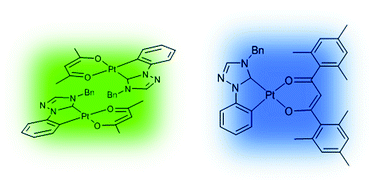C^C* cyclometalated platinum(ii) N-heterocyclic carbene complexes with a sterically demanding β-diketonato ligand – synthesis, characterization and photophysical properties†
Abstract
Neutral cyclometalated platinum(II) N-heterocyclic carbene complexes [Pt(C^C*)(O^O)] with C^C* ligands based on 1-phenyl-1,2,4-triazol-5-ylidene and 4-phenyl-1,2,4-triazol-5-ylidene, as well as acetylacetonato (O^O = acac) and 1,3-bis(2,4,6-trimethylphenyl)propan-1,3-dionato (O^O = mesacac) ancillary ligands were synthesized and characterized. All complexes are emissive at room temperature in a poly(methyl methacrylate) (PMMA) matrix with emission maxima in the blue region of the spectrum. High quantum efficiencies and short decay times were observed for all complexes with mesacac ancillary ligands. The sterically demanding mesityl groups of the mesacac ligand effectively prevent molecular stacking. The emission behavior of these emitters is in general independent of the position of the nitrogen in the backbone of the N-heterocyclic carbene (NHC) unit and a variety of substituents in 4-position of the phenyl unit, meta to the cyclometalating bond.

- This article is part of the themed collection: Luminescent Complexes and Materials for Light-Emitting Devices

 Please wait while we load your content...
Please wait while we load your content...